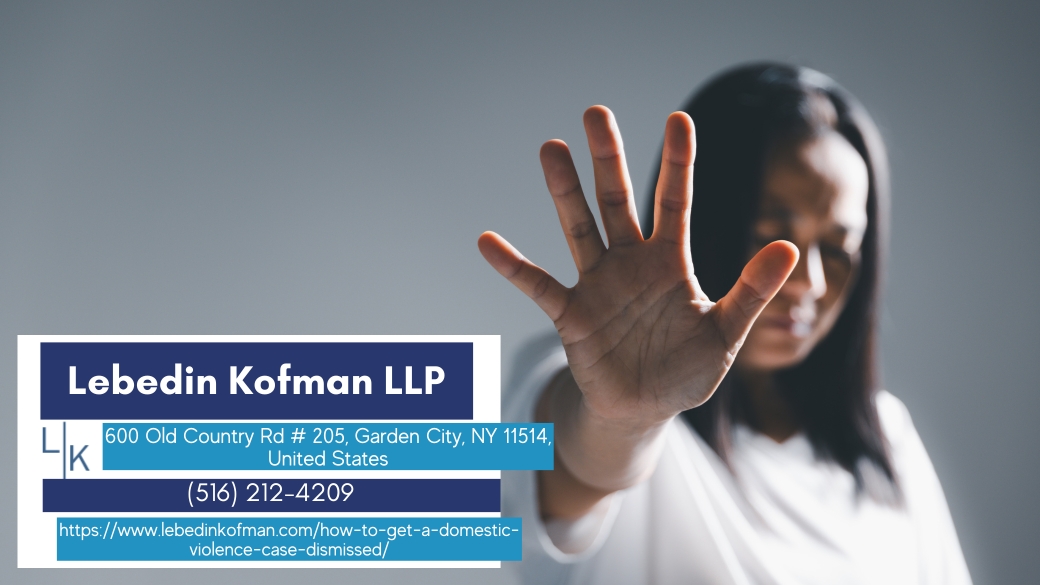Nassau County domestic violence lawyer Russ Kofman (https://www.lebedinkofman.com/how-to-get-a-domestic-violence-case-dismissed/), of Lebedin Kofman LLP, offers crucial advice on how to handle the complex matter of domestic violence charges and increase the chances of getting a case dismissed. Domestic violence cases are serious and often fraught with challenges, especially for those who are wrongfully accused. Kofman provides insights into the legal processes involved and the potential outcomes for those facing such charges.
In the article, the Nassau County domestic violence lawyer emphasizes that domestic violence accusations are taken very seriously by law enforcement and the state of New York. "Because of the dangerous nature of domestic violence, New York law enforcement officers are required to make a mandatory arrest when they have probable cause to believe that violence has occurred," Kofman explains. As a result, domestic violence charges are often filed regardless of the accuser's intent or the veracity of the claims. This can leave individuals facing life-altering legal battles, even if they are innocent of the accusations.
The Nassau County domestic violence lawyer goes on to discuss the steps that individuals should take if they find themselves accused of domestic violence. Immediate legal representation is critical, as Kofman notes, "Domestic violence charges are not easily dropped, even when the accusations are untrue." The burden of defending oneself against these charges is heavy, and without a skilled legal defense, the accused could face severe consequences, including criminal penalties and long-term personal repercussions.
Kofman underscores the difficulty in getting domestic violence charges dismissed once they have been filed. While many people mistakenly believe that the accuser can simply drop the charges, the reality is more complex. In New York, once an arrest is made, the state is responsible for pursuing the case. "The state brings criminal charges, so once the arrest has been made and charges filed, only the state can dismiss them," Kofman points out. This means that even if the accuser wants to recant their statement or refuses to cooperate, the charges may still proceed, leaving the defendant in a precarious legal position.
However, not all domestic violence cases end in conviction. Russ Kofman outlines several scenarios in which domestic violence charges may be dismissed before going to trial. A lack of clear evidence is one such factor that can lead to a case being dropped. If the prosecution cannot gather sufficient proof to support the allegations—such as medical records, photos of injuries, or corroborating witnesses—then the case may not hold up in court. "For a conviction, the prosecution must prove the allegations beyond a reasonable doubt," Kofman explains, adding that without concrete evidence, the chances of securing a conviction diminish significantly.
In some cases, the accuser's history of making false claims may also work in the defendant's favor. If the state discovers a pattern of false accusations, this can undermine the accuser's credibility and result in a dismissal of charges. Additionally, if the accuser refuses to cooperate with the prosecution or recants their story, this can make it difficult for the state to proceed with the case.
Kofman also highlights the importance of witness testimony in domestic violence cases. "If there are witnesses who can submit statements that contradict the accuser's version of events, or if the accuser was actually the aggressor, this can weigh heavily in favor of the defendant," Kofman states. In such instances, witness testimony can be a pivotal factor in getting a case dismissed.
For those facing domestic violence charges, Kofman advises against accepting a plea deal without thoroughly exploring all legal options. While pleading guilty may seem like the easiest solution, it can have long-lasting consequences, including restricted access to children, loss of housing opportunities, and a tarnished reputation. An experienced domestic violence lawyer can help defendants understand the full scope of their options and the potential ramifications of any legal decision.
The Nassau County domestic violence lawyer emphasizes that each case is unique, and outcomes vary depending on the specifics of the situation. "There is no guarantee for domestic violence cases to be resolved in a particular way," Kofman cautions. However, with the right legal strategy, it is possible to secure a more favorable outcome, such as a case dismissal or reduced charges.
For anyone facing domestic violence allegations, Kofman stresses the importance of taking immediate action to secure a strong legal defense. "If you are facing criminal domestic violence charges, a conviction will have a long-lasting impact on your life, reputation, and future," Kofman warns. Even if the accusations are false, these cases are prosecuted vigorously, making it essential to have a domestic violence attorney who can thoroughly investigate the incident and explore every legal avenue.
About Lebedin Kofman LLP:
Lebedin Kofman LLP is a law firm in Nassau County, New York, that can provide skilled legal defense for individuals facing criminal charges, including domestic violence cases. With a strong focus on protecting the rights and future of their clients, the firm has built a reputation for offering effective legal solutions in Nassau County and throughout New York.
Embeds:
Youtube Video: https://www.youtube.com/watch?v=6kgk0cMTwWY
GMB: https://www.google.com/maps?cid=258186473269305515
Email and website
Email: info@lebedinkofman.com
Website: https://www.lebedinkofman.com/nassau-county-criminal-lawyer/
Media Contact
Company Name: Lebedin Kofman LLP
Contact Person: Russ Kofman
Email:Send Email
Phone: (516) 212-4209
Address:600 Old Country Rd # 205
City: Garden City
State: New York 11514
Country: United States
Website: https://www.lebedinkofman.com/nassau-county-criminal-lawyer/

